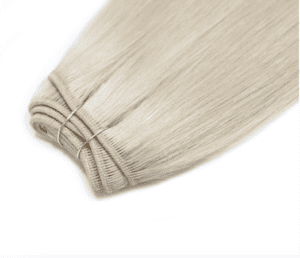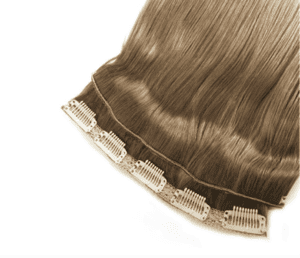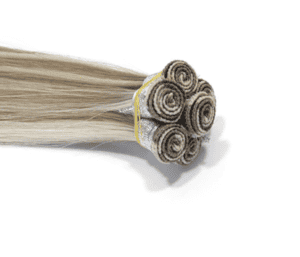
As consumers become more aware of the environmental impact of their purchases, they are looking for sustainable solutions in every industry.
The hair extension industry is no exception, and companies that offer sustainable options all that hair can gain a competitive advantage in the marketplace.
With this shift towards sustainability in synthetic hair industry, it’s important for hair extension suppliers to understand how their products affect the environment and what steps they can take to reduce their environmental footprint.
This article will explore sustainable solutions for the hair extension industry to reduce its environmental impact and help hair businesses, salon owners, and online retailers become more eco-friendly.
Environmental Impact of Human Hair Extensions

Human hair extensions have an environmental impact for a variety of reasons. The most obvious is the harvesting of human and animal hair itself, which can be particularly damaging if it is sourced without proper consent and oversight.
In addition, many waste human and dog hair, are made with synthetic materials and harmful chemicals, which can be detrimental to the environment when they are discarded or released into waterways.
Human hair extensions account for a significant portion of the global synthetic hair and care industry, worth an estimated $19 billion.
It is important to ethically source human hair biodegradable, and reduce the number of synthetic materials used in the production used synthetic hair, to ensure that the hair extension industry is sustainable.
Sustainable Solutions for the Hair Extension Industry
Alternative hair extension materials that are more eco-friendly, such as natural hair, synthetic hair, and plant-based fibers
The first step to creating a more sustainable hair extension industry is to source materials responsibly.
Natural human hair extensions are the most environmentally friendly option, as they are made from real human hair, but require careful oversight and harvesting practices to be ethical and sustainable.
Synthetic materials, such as synthetic fibers and plant-based fibers, are another way to reduce the environmental impact of hair extensions. These materials are often produced with fewer chemicals and require less energy to produce than natural hair, but they can be more fragile and may not last as long.
When it comes to sourcing these materials, suppliers should look for manufacturers that practice sustainability by recycling or using organic materials, upcycling old fibers, and using renewable energy sources.
They should also look for companies that are transparent about their production processes and ethical practices and those that prioritize the health of their workers by providing fair wages and safe working conditions.
Finally, suppliers can reduce their environmental risks by minimizing packaging waste through the use of recycled or recyclable materials and being mindful of how much water and energy is used in the production process.
By taking these steps, hair extension suppliers can make their beauty industry more sustainable and ethical.
This will not only benefit the environment but also secure a brighter future for all those involved in this rapidly growing business.
Recycling and upcycling hair extensions to reduce hair waste material
Recycling and upcycling hair extensions is an important part of reducing waste in the hair salon industry.
By using and reusing remy hair extensions, suppliers can extend the life cycle of each extension, thus avoiding creating waste that takes centuries to decompose.
When paired with sustainable sourcing practices, upcycling hair extensions can ensure that suppliers are doing their part to reduce their environmental hazards and take a proactive stance on sustainability.
By taking these steps, suppliers can demonstrate to customers that they care about the environment, as well as help create a sustainable future for the hair extension industry.
Using sustainable packaging materials and reducing packaging waste
Using sustainable packaging materials and reducing packaging waste is another way for suppliers to reduce their environmental impact.
By switching from plastic packaging to fully biodegradable materials such as recycled paper, cardboard, or even organic matter, suppliers can ensure their products are packaged in a more sustainable way.
Fully biodegradable packaging materials break down into its component parts over time, making it easier to dispose of them without causing any long-term damage or contamination to the environment.
Furthermore, they are often made with fewer chemicals and require less energy to produce than plastic packages.
Moreover, by using biodegradable packaging materials instead of plastic ones, suppliers can show that they prioritize sustainability over convenience.
This will also help create trust and loyalty among consumers who are increasingly aware of the environmental consequences of their purchasing choices.
Finally, reducing the amount of packaging used for each product can also make a big difference in terms of waste reduction.
Businesses should look for ways to package products in bulk instead of individually so that each product takes up less space and resources during shipping and storage.
By taking these steps to reduce their environmental footprint with more sustainable packaging materials and practices, suppliers can ensure that their hair extensions come with minimal environmentally damaging effects.
Implementing energy-efficient practices in the production and distribution of hair extensions
Implementing energy-efficient practices in the production and distribution of hair extensions is one way that suppliers can reduce their environmental impact.
By utilizing renewable sources of energy, such as solar or wind, during production processes or when shipping products to customers, suppliers can help ensure that they are not contributing to global warming while still providing quality hair extensions.
Additionally, suppliers should consider ways to minimize the waste of human hair and synthetic hairs used in the manufacturing process by purchasing pre-order fibers or recycling unused materials whenever possible.
Going green with these methods helps companies demonstrate an investment in sustainability and do their part to reduce the landfill of human hair waste caused by excess human and synthetic hair discarded by salons around the world.
Additionally, many sustainable sourcing hair salons and companies provide recycled raw materials that are just as effective for creating quality hair extensions without sacrificing on style or durability.
By making small changes like these within their production processes, suppliers can take a proactive stance on reducing waste from human hair, and synthetic hair waste created throughout the industry every year.
Companies who make use of renewable resources increase efficiency whilst also demonstrating responsibility towards both people and the planet – two key drivers behind any successful business today!
Supporting sustainable and ethical sourcing practices for hair extensions
When it comes to hair extensions, sourcing sustainable, ethical materials is essential for reducing the environmental impact of the industry.
One way to ensure that these materials are sourced in an ethical and sustainable manner is through hair donations. Hair donations come from cancer patients and other people who have opted to donate their hair rather than throw it away.
By sourcing hair through these donations, suppliers can help reduce waste while also helping benefit cancer patients and those with alopecia or other conditions that cause hair loss.
Using hair donations also helps ensure that suppliers are using ethically sourced materials and not contributing to the unethical practices employed by some companies in India where human hair is sourced without permission or consent from donors.
Moreover, donating one’s excess hair has been known to be a powerful emotional experience for many donors as it can be used to provide wigs for cancer patients who have lost their own hair due to treatments or alopecia sufferers.
Furthermore, some organizations even offer free services like haircuts for cancer patients who want to donate their locks before undergoing chemotherapy treatments.
By utilizing sustainable and ethical sourcing practices such as hair donations, suppliers can help reduce their environmental impact while also giving back to those in need.
The Benefits of Sustainable Solutions for Hair Extensions Business

Environmental benefits of sustainable solutions
The implementation of sustainable practices in the production and distribution of hair extensions offers a range of environmental benefits.
As mentioned, utilizing renewable sources of energy can help reduce the production process’ contribution to global warming. Additionally, sourcing materials through donation drives or other ethical practices help reduce the amount of waste created by the industry every year.
Furthermore, implementing waste-reduction initiatives such as recycling unused materials or purchasing pre-ordered fibers can also lower companies’ emissions while still providing quality hair extensions.
Moreover, companies that invest in sustainable practices also demonstrate their commitment to being socially responsible and are better equipped to handle any potential environmental regulations in the future.
They can even consult with environmental protection agencies to ensure that the hair is ethically sourced.
Ultimately, these sustainable solutions are beneficial for both people and the planet – two key drivers behind any successful business today!
Social and economic benefits for hair businesses, salon owners, and online retailers
Making the switch to sustainable hair extensions also offers a number of social and economic benefits.
For one, utilizing renewable resources makes businesses more cost-effective while still providing quality hair products. Additionally, using ethically sourced materials helps ensure that suppliers are not contributing to unethical labor practices or environmental destruction associated with some sourcing practices.
Furthermore, investing in sustainable solutions can help attract customers who seek out companies that practice ethical sourcing and have an eco-friendly mindset.
Moreover, supporting sustainable and ethical sourcing initiatives also helps empower salon owners and online retailers by allowing them to offer their clients high-quality products without compromising on ethics or sustainability.
Making the switch to sustainable hair extensions also offers a number of social and economic benefits.
Building a positive brand image
Adopting sustainable solutions for hair extensions can also help create a positive brand image for businesses in the industry.
By investing in sustainable practices, suppliers are demonstrating their commitment to responsible business practices and helping to build trust with both consumers and other industry professionals.
Moreover, utilizing renewable sources of energy or ethically sourced materials is a great way for companies to differentiate themselves from their competitors and make sure they stand out in an increasingly crowded market.
Investing in sustainable solutions can foster long-term customer relationships, enhance brand image and ultimately lead to more successful business ventures in the future.
Conclusion
Overall, investing in sustainable solutions for the hair extension industry is beneficial both to businesses and customers alike.
Not only does it offer a range of environmental benefits but also helps create positive brand images while fostering long-term customer relationships.
By utilizing renewable sources of energy, ethically sourced materials, and implementing waste reduction initiatives, suppliers can ensure that their products are not contributing to unethical labor practices or environmental destruction associated with some sourcing practices.
Ultimately, these sustainable solutions will help revolutionize the way we think about beauty and sustainability in the future!








